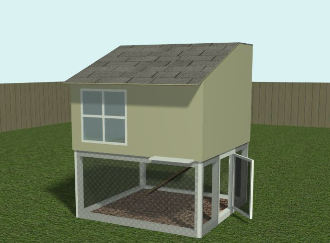This may surprise you, but chickens behave a lot like humans. As humans, we like to compartmentalize our life. We prefer to eat in one place, sleep in another, and play in another. Chickens prefer the same type of atmosphere, and also prefer clean living spaces. Remember this when you are constructing your chicken laying boxes.
Laying, or nesting boxes are where your hens will deposit their eggs. In the wild, hens like to have a lot of padding, and a clean, dry place to lay, so you should strive for this when constructing your boxes for your hens. Hens like to be surrounded on all sides, so it is best to construct and place your nesters off the ground and against a wall. Feel free to place a top on these, so your hens will feel snugger.
It is ideal to have one nester for every two hens. Many people try to do with less than this, because of space restraints. If you plan on using less than this amount, and you notice eggs deposited outside of the nests, this is a clear sign that you need to add more boxes.
Do not assume that wood makes the best material for laying boxes, because you can use whatever sturdy material you have available. Keep in mind, you will need to accommodate your larger and smaller size birds. Make sure even your larger birds have enough space to turn around comfortably, while still feeling secure in their boxes.
Hens prefer to lay in dark, dry spaces, and so consider this when deciding where to place your nesters.
Do not place your chicken laying boxes where they will be in direct sunlight. Rather, if you have a window in your coop, place your nesting boxes underneath the window. Equally important is remembering not to place your chicken laying boxes underneath the roosting poles! Chickens tend to go to the bathroom when they roost and you certainly do not want them going to the bathroom on your nesters!
Place 3-4 inches of padding in each box. This may seem like a lot, but your hens will kick and move the padding, and it will also become padded down the more your chickens sit in it. Untreated wood shavings (preferably pine), paper shreds, straw and soft hay all make excellent bedding. If using wood shavings do not use cedar or walnut varieties because of the natural irritants that can be harmful to your flock.
Because chickens prefer a clean environment, spot clean the boxes every few days. Then, completely clean out and replace the bedding every few weeks. This will keep the area clean, and will also prevent ammonia build-up in your coop, which is potentially dangerous for both you and your flock.
As the owner of a flock, it is your responsibility to provide a hospitable environment for your hens, so they do not become stressed. This will ensure your hens are happy, and that they will produce the quantity of eggs you desire.
Don’t forget to include chicken laying boxes when planning your backyard chicken coop. Remember, happy hens make happy layers and happy layers means more eggs!
Related Laying Chickens Articles



Leave a Reply